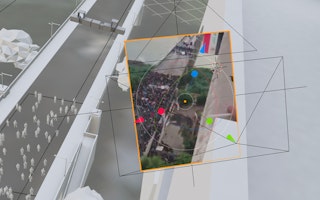The Role of the Internet in Building Just and Open Societies
By Chris Stone
Today, the Open Society Foundations joined the Ford, Knight, MacArthur, and Mozilla Foundations in a public commitment to work towards an internet that is built, used, and governed in ways that allow everyone to access it and benefit from its potential. Given our starting point, this will not be straightforward. The world’s communications infrastructure needs to contend with pervasive surveillance, censorship, and misinformation. The need for us, as foundations, to join in advancing the public interest in this rapidly evolving digital environment is greater than ever.
I invite you to read the Declaration of Principles [PDF] underlying this collaborative initiative. I also want to explain some of the ways the Open Society Foundations contribute to the important issues it addresses.
The declaration seeks to make the internet an open, secure, and fair space protecting free expression and privacy, and advancing economic opportunity, knowledge exchange, and civic engagement that everyone can access and afford. These are high priorities for the Open Society Foundations. While the internet is a powerful tool that holds great benefits for disadvantaged communities, many still cannot afford access. In many parts of the world, low-income consumers and marginalized groups have no access at all or lag far behind in broadband adoption.
Sixty percent of the world’s population, or more than four billion people, have little or no internet access; even in the United States, broadband penetration in tribal lands and native communities is less than 10 percent. Working to change this situation—through, for example, growing the publicly shared as opposed to privatized use of wireless spectrum—is crucial if the internet is to become a space of opportunity for marginalized communities around the world instead of another aspect of their disenfranchisement. To the same end, the Open Society Foundations work to secure effective legal protections for net neutrality, in an effort to create a level playing field for all online services and users.
The declaration also commits to leveraging the networked public sphere [PDF] to support new methods of civic and social participation, lower barriers to engagement, and develop innovative ways to organize for positive change and social justice. A growing number of tech and data-savvy activists are driving experimentation forward. The Open Society Foundations work to support the long-term development of a broad civic sector armed with the skills and capabilities to critically evaluate and exploit these advances for their own advocacy.
Even as we promote access and openness, we’re working to guard against the harm these new technologies enable: mass surveillance by governments and corporations, decision-making by opaque algorithms, and new ways to manipulate public opinion, censor free expression, and spread misinformation. At the Open Society Foundations we envision a vibrant public sphere, with protections that allow full participation by individuals from any political or social background. This includes effective democratic oversight of intelligence agencies—in particular, with regard to their largely unchecked surveillance activities, aiming to ensure that any permitted surveillance is necessary and proportionate. It also includes legal protections allowing users to control their personal data and profiles, as well as access to strong, easy-to-use anonymity and encryption tools.
In its commitment to equip young people with the skills they need to succeed in a connected, complex world, the declaration acknowledges the importance of digital literacy, critical thinking, and more. This commitment is especially important as copyright grows more restrictive and fair use is constricted, blocking access to knowledge even in educational materials. From its beginning, we have been part of the Open Access movement, whose ongoing work is opening educational resources to billions around the world.
We join in the declaration’s commitment to enable government, business, and civil society leaders to understand and fulfill the promise of the internet. Inevitably, however, there will be instances in which internet technologies are not used in the public’s best interest. For this reason, we are supporting a field of civil society organizations that work to advance regulation that keeps pace with technological development and protects human rights. By a similar token, we must strengthen democratic practices that aim to make decision-making about the internet open, transparent, and inclusive. To recognize the urgency of this issue, look no further than proposed trade agreements such as the Trans-Pacific Partnership or Trade in Services Agreement, which are negotiated mostly in secret and advance proposals that may put human rights and privacy at risk.
In our own internal practices, the Open Society Foundations are committed to data security and data ethics, protecting our staff colleagues, our systems, and our grantees’ data. Our dedicated IT staff constantly monitor our systems to guard against cyber theft and attacks using state-of-the-art software. On several occasions we have assisted our partners in philanthropy and grantees when they have come under cyber attack. We are actively testing ways to help grantees protect their communications, including those with us.
This declaration reflects a cornerstone of the Open Society Foundations’ daily efforts. We look forward to working with established partners and new ones with a common ambition to curtail the use of digital technologies as tools for repression and manipulation, and to strengthen their use in building more just, accessible, and open societies.
Until December 2017, Chris Stone was president of the Open Society Foundations.


